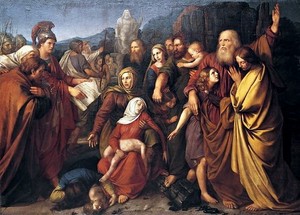1 Maccabees 1
Alexander the Great
1 After Alexander son of Philip, the Macedonian, who came from the land of Kittim, had defeated King Darius of the Persians and the Medes, he succeeded him as king. (He had previously become king of Greece.) 2 He fought many battles, conquered strongholds, and put to death the kings of the earth. 3 He advanced to the ends of the earth, and plundered many nations. When the earth became quiet before him, he was exalted, and his heart was lifted up. 4 He gathered a very strong army and ruled over countries, nations, and princes, and they became tributary to him. 5 After this he fell sick and perceived that he was dying. 6 So he summoned his most honored officers, who had been brought up with him from youth, and divided his kingdom among them while he was still alive. 7 And after Alexander had reigned twelve years, he died. 8 Then his officers began to rule, each in his own place. 9 They all put on crowns after his death, and so did their descendants after them for many years; and they caused many evils on the earth.
